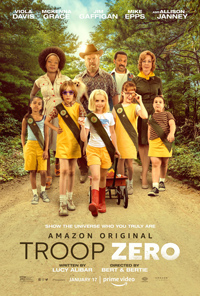Feeling Like a Number One: Bert & Bertie Get Glossy with Good Intentions

For those who prefer to view the world through rosy-tinted glasses, there’s plenty to cheer for in Troop Zero, the sophomore feature of London based duo Bert & Bertie. A feel-good period piece featuring a stellar ensemble cast and written by Lucy Alibar (her first script since 2012 breakout Beasts of the Southern Wild), a cast of young misfits coming together despite cultural and economic barriers in rural Georgia has all the fixings of a schmaltzy crowd-pleaser, but begs not to be examined too closely as far as realities of time, place or circumstance are concerned.
In the 1977 rural town of Wiggly, Georgia, young Christmas Flint (Mckenna Grace) dreams of outer space. Her mother recently passed away and she’s looked after by her distracted father (Jim Gaffigan), an unsuccessful lawyer whose clients can’t afford to pay him. Her other adult guardian is the somewhat surly Miss Raynell (Viola Davis), her father’s employee. When she overhears Miss Massey (Allison Janney) introducing a NASA employee to the local Birdie Scout troop about a contest whereby the winning troop will be recorded on NASA’s Golden Record and their voices transported into space, Christmas forms a makeshift Birdie Scout troop with her best friend Joseph (Charlie Shotwell) and a group of other local misfits, such as the intimidating Hell-No (Milan Ray) and her acolyte, Smash (Johanna Colon). Miss Raynell is reluctantly recruited as their troop leader and her past with Miss Massey proves to be another obstacle to their success.
While calling out its narrative as predictable would be an understatement, Troop Zero unfortunately suffers not only from superficiality but also a blissful cultural ignorance. Sidestepping the unpleasant realities of the rural South, Bert & Bertie would have been better served to set their story in more contemporary climes.
There’s hardly more than a polite eye batted at Charlie Shotwell’s flamboyant young preadolescent, for instance, which is likely not a point of contention for the film’s intended audience, i.e., folks who would rather ignore or forget the significantly virulent homophobia which would have been meted out to a young boy like Joseph. Worse is how the film handles its black characters who all either serve secondary purposes for the support of the taken-for-granted white foci or whose disenfranchisement is blatantly ignored.
Viola Davis’ (serving as producer) Miss Raynell is an incomplete composite, which isn’t helped by an evident coldness from the actor. Her desire to attend law school is met with polite drama by her employer, a hapless and buffoonish Jim Gaffigan, who requests she stay behind instead and assist in raising his daughter. The presence of Milan Ray’s Hell-No Price, who isn’t even allowed an actual moniker, is more egregious, a young hellion who is shown to fend for herself and the proper care of whom is never seen to by any of the film’s adults—Hell-No is merely a supporting character in this narrative, but how she and Miss Raynell are written point to a blatant cultural incompetence from the writer and directors.
Though Janney, playing a closet alcoholic whose intentions aren’t well-formed and whose meager redemption is inanely administered to honor the emotional resonance of the climax, is a joy to watch with Davis (perhaps a stronger, more complex narrative could have focused on their history), this is a film in keeping with the two Tate Taylor films both previously starred in, 2011’s The Help and 2014’s Get on Up: white-washed and neutered. As its young lead, Mckenna Grace (who also played a preciously worshipped white child in 2017’s Gifted, with Octavia Spencer playing a similar composite to what Davis is written as here) hits all the right notes, while her friendship with Milan Ray is one of convenience. Mike Epps is also on hand, though underutilized.
★★½/☆☆☆☆☆


